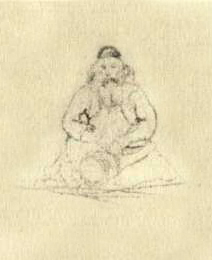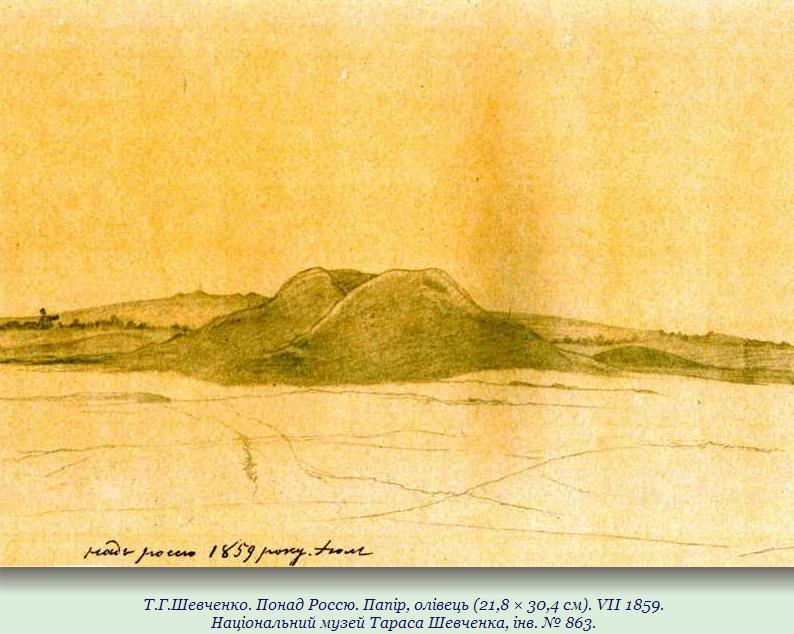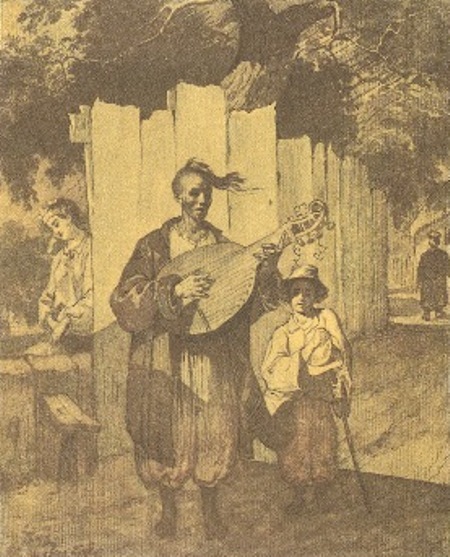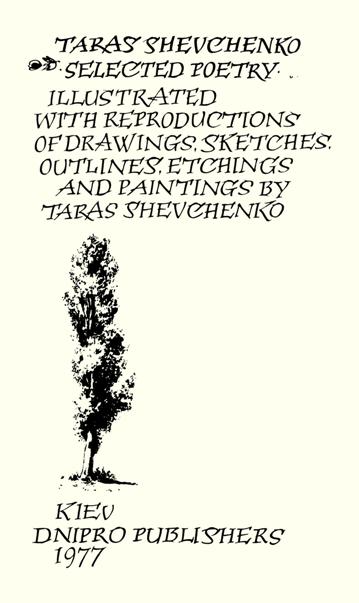|
Тарас Шевченко
ПЕРЕБЕНДЯ
(Є. П. Гребінці)
Перебендя старий, сліпий –
Хто його не знає?
Він усюди вештається
Та на кобзі грає.
А хто грає, того знають
І дякують люди:
Він їм тугу розганяє,
Хоть сам світом нудить.
По-під тинню сіромаха
І днює й ночує; –
Нема йому в світі хати;
Недоля жартує
Над старою головою,
А йому байдуже!
Сяде собі, заспіває:
„Ой не шуми, луже!”
Заспіває, та й згадає,
Що він сиротина,
Пожуриться, посумує,
Сидячи під тином.
Отакий-то Перебендя,
Старий та химерний!
Заспіває про „Чалого”,
На „Горлицю” зверне;
З дівчатами на вигоні
„Гриця” та „веснянку”,
А у шинку з парубками –
„Сербина”, „Шинкарку”;
З жонатими на бенкеті
(Де свекруха злая)
Про тополю – лиху долю,
А потім – „У гаю”;
На базарі – про „Лазаря”,
Або, щоб не знали,
Тяжко-важко заспіває,
Як Січ руйнували.
Отакий-то Перебендя,
Старий та химерний:
Заспіває, засміється,
А на сльози зверне.
Вітер віє – повіває,
По полю гуляє, –
На могилі кобзарь сидить
Та на кобзі грає,
Кругом його степ, як море
Широке, синіє;
За могилою – могила,
А там – тілько мріє.
Сивий ус, стару чуприну
Вітер розвіває,
То приляже та послуха,
Як кобзарь співає,
Щоб вітер по полю слова розмахав,
Як серце сміється, сліпі очі плачуть...
Послуха, повіє...
Старий заховавсь
В степу на могилі, щоб ніхто не бачив,
Щоб люди не чули, – бо то Боже бачив,
То серце по волі з Богом розмовля,
То серце щебече Господню славу,
А думка край світа на хмарі гуля.
Орлом сизокрилим літає, ширяє,
Аж небо блакитне широкими бьє,
Спочине на сонці, його запитає:
Де воно ночує? Як воно встає?
Послухає моря, що воно говорить,
Спита чорну гору: чого ти німа?
І знову на небо, бо на землі горе,
Бо на їй, широкій, куточка нема
Тому, хто все знає, тому, хто все чує:
Що море говорить, де сонце ночує, –
Його на сім світі ніхто не прийма!
Один він між нами, як сонце високе;
Його знають люди, бо носить земля.
А як-би почули, що він, одинокий,
Співа на могилі, з морем розмовля, –
На Божеє слово вони б насміялись,
Дурним би назвали, од себе б прогнали:
„Нехай по-над морем”, сказали б, „гуля!”
Добре єси, мій кобзарю,
Добре, батьку, робиш,
Що співати-розмовляти
На могилу ходиш!
Ходи собі, мій голубе,
Поки не заснуло
Твоє серце, та виспівуй,
Щоб люди не чули!
А щоб тебе не цурались,
Потурай їм, брате!
„Скачи, враже, як пан каже:
На те він багатий”.
Отакий-то Перебендя,
Старий та химерний!
Заспіває весільної,
А на сльози зверне.
|
|




